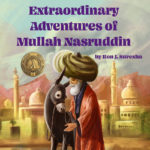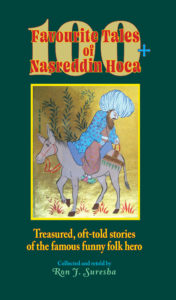Out in Print review of Immortal Mullah Nasruddin
Reviewed by Jerry Wheeler
I don’t know where I’ve been for the last few thousand years, but I had never heard of the incomparable Mullah Nasruddin until last summer when I was discussing this project with Ron Suresha. The deliciously filthy anecdotes he shared with me do not appear in The Uncommon Sense of the Immortal Mullah Nasruddin, but in the introduction, Suresha promises an unexpurgated volume will follow. I certainly hope so.
For those unfamiliar with the great man, Nasruddin is a Persian folk hero with the “wise fool” characteristics carried down in the oral traditions of other cultures throughout the centuries. Suresha does a terrific job of tracing down Nasruddin’s pedigree in his highly readable introduction, but the real meat of the book is in the stories themselves, traditionally read in groups of seven.
Staunch traditionalist that I am, that’s exactly how I read them. Mullah Nasruddin emerges from these tales as a scholar, a wit, a fool, a counselor, a teacher and a lawyer—with many other roles in between. His wisdom is funny, universal and pointed, and there is much to be learned from the great Mullah. If, at times, some of the stories remind one of old vaudeville jokes, it’s important to remember that these tales are their antecedents.
“Young Nasruddin decided to learn a musical instrument, so he called upon a music instructor. ‘How much do you charge for private lute lessons?’ asked the boy. ‘The lute is not an easy instrument to learn,’ answered the teacher. ‘I charge three silver coins for the first month and one silver piece for each month after that.’ ‘Fine,’ agreed Nasruddin, ‘I’ll start with the second month.’”
Rim shot, please.
But this is only one facet of a truly multi-faced character. His exchanges with the despotic Tamerlane are barbed and intelligent, and punchlines such as the one above are mere punctuation in the larger scope of the work. Suresha has also done a wonderful job of updating the language and cultural references but retaining the Old World flavor. Although there are no long, descriptive passages of the time or place, Suresha’s detailing is so precise that by the middle of the book, you can see the town of Aksehir as if it were right outside your window.
Is this a queer book? Er, uh …cough… no. But Suresha is a pillar of the gay/bi/bear lit community, and his projects always have diversity shining through their pages. So, take a break from the usual romances, vampires, angst and coming out stories and climb up beside Nasruddin riding his donkey—facing backwards, of course.
You just might get a whole new perspective.


